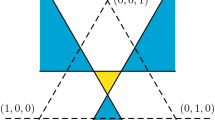Abstract
We propose a new notion of coalitional equilibria, the strong \(\beta\)-hybrid solution, which is a refinement of the hybrid solution introduced by Zhao. Zhao’s solution is well suited to study situations where people cooperate within coalitions but where coalitions compete with one another. This paper’s solution, as opposed to the hybrid solution, assigns to each coalition a strategy profile that is strongly Pareto optimal. Moreover, like the \(\beta\)-core, deviations by subcoalitions of any existing coalition are deterred by the threat of a unique counter-strategy available to the non-deviating players. Zhao proved the existence of existence of strong \(\beta\)-hybrid solution for transferable utility games with compact and convex strategy spaces and concave continuous payoff functions. Here, we extend his result to non-transferable utility games.
Similar content being viewed by others
Notes
By contrast, the coalitional equilibria concepts initially defined by Aumann, namely the \(\alpha\) and \(\beta\) cores require that each conceivable coalition should not break away from a prealably agreed strategy profile.
That is, not all the members of a deviating sub-coalition need to be strictly better off when opting out of a coalition. Some members can be willing to leave the coalition in order to help others, as long as they do not suffer any loss.
The strong separability assumption is satisfied if “the outsider’s action that best punishes (as a second mover) coalition S is also the action that best punishes (as the first mover) each member of the coalition.” (see Zhao, ibid, p. 157). Zhao’s approach and the strong separability assumption are used by Meinhardt (2002) to establish the existence of \(\beta\)-equilibrium for common pool games.
By contrast, the hybrid solution and the strong hybrid solution have an \(\alpha\)-core flavor.
A topological space is called first countable if every point has a countable neighborhood basis.
The definitions apply mutatis mutandis to correspondences \(\Gamma X \rightrightarrows Y\) where Y is a subset of \(\mathbb {R}^l\).
To extend this existence result to more general specifications of the game, we simply need to make sure that for each \(x\in X\) and for each \(i\in I\), \(v_i^{\prime \prime }(\underset{j\in I}{\sum }x_j)\ge 0\) and \(g_i^{\prime \prime }(x_i)\le 0\). Under these conditions the functions \(u_i(x)\) are concave on X and we can easily prove as with Chander’s specification above that the correspondence is strictly-nonempty valued.
References
Allen, N. (2000). The future of microeconomic theory. Journal of Economic Perspectives, 14, 143–150.
Aliprantis, C. B., & Border, K. C. (2006). Infinite dimensional analysis: A Hitch-hiker’s Guide (3rd ed.). Springer.
Aumann, R. J. (1959). Acceptable points in general cooperative \(n\)-person games. In A. Tucker & D. Luce (Eds.), Contributions to the theory of games 4, annals of mathematics studies (Vol. 40). Princeton University Press.
Aumann, R. J. (1961). The core of a cooperative game without side payments. Transactions of the American Mathematical Society, 98, 539–552.
Chander, P. (2007). The gamma-core and coalition formation. International Journal of Game Theory, 35, 539–556.
Crettez, B., Nessah, R., & Tazdaït, T. (2021). On the strong hybrid solution of an n-person game. Mathematical Social Sciences, 0(0), 0–19.
Kajii, A. (1992). A generalization of Scarf’s theorem: An \(\alpha\)-core existence theorem without transitivity or completeness. Journal of Economic Theory, 5(6), 194–205.
Meinhardt, H. (2002). Cooperative decision making in common pool situations. Lecture Notes in Economics and Mathematical Systems 517. Springer.
Nessah, R., & Tazdaït, T. (2013). Absolute optimal solution for a compact and convex game. European Journal of Operational Research, 224, 353–361.
Scarf, H. E. (1971). On the existence of a cooperative solution for a general class of \(N\)-person games. Journal of Economic Theory, 3, 169–187.
Shapley, L., & Shubik, M. (1971). On the core of an economic system with externalities. The American Economic Review, 41, 678–684.
Yang, Z., & Yuan, G. X. (2019). Some generalizations of Zhao’s theorem: Hybrid solutions and weak hybrid solutions for games with nonordered preferences. Journal of Mathematical Economics, 84, 94–100.
Yano, M. (1990). A local theory of cooperative games. International Journal of Game Theory, 19, 301–324.
Zhao, J. (1983). Results on the absolute solutions of multiobjective mathematical programming. Journal of Beijing Institute of Aeronautics and Astronautics, 3, 107–114.
Zhao, J. (1992). The hybrid solutions of an \(n\)-person game. Games and Economic Behavior, 4, 145–160.
Zhao, J. (1996). The hybrid equilibria and core selection in exchange economies with externalities. Journal of Mathematical Economics, 26, 387–407.
Zhao, J. (1999). The existence of TU \(\alpha\)-core in normal form games. International Journal of Game Theory, 28, 25–34.
Zhao, J. (1999). A \(\beta\)-core existence result and its application to oligopoly markets. Games and Economic Behavior, 27, 153–168.
Zhao, J. (2018). TU oligopoly games and industrial cooperation. In Luis C. Corchón & A. Marini Marco (Eds.), Handbook of Game Theory and Industrial Organization. Edward Elgar.
Author information
Authors and Affiliations
Corresponding author
Ethics declarations
Conflict of interest
The authors have no relevant financial or non-financial interests to disclose.
Additional information
Publisher's Note
Springer Nature remains neutral with regard to jurisdictional claims in published maps and institutional affiliations.
We thank an anonymous referee as well as editor for stimulating and constructive comments on a previous version of this work.
Rights and permissions
Springer Nature or its licensor holds exclusive rights to this article under a publishing agreement with the author(s) or other rightsholder(s); author self-archiving of the accepted manuscript version of this article is solely governed by the terms of such publishing agreement and applicable law.
About this article
Cite this article
Crettez, B., Nessah, R. & Tazdaït, T. On the strong \(\beta\)-hybrid solution of an N-person game. Theory Decis 94, 363–377 (2023). https://doi.org/10.1007/s11238-022-09900-0
Accepted:
Published:
Issue Date:
DOI: https://doi.org/10.1007/s11238-022-09900-0




